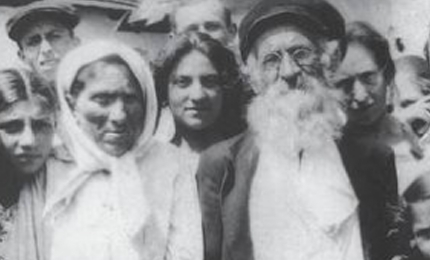“Hath not a Jew eyes? Hath not a Jew hands, organs, dimensions, senses, affections, passions; fed with the same food, hurt with the same weapons, subject to the same diseases, healed by the same means, warmed and cooled by the same winter and summer as a Christian is?”1 The words of Shylock, the main character in the Shakespearean play, The Merchant of Venice echo in my mind repeatedly in the wake of the latest Pittsburgh shooting that took place at a local temple. The shooting took the lives of eleven people during Saturday morning Shabbat on October 27th, 2018. Antisemitism has been on the rise recently in the US and around the world, persecution is not only in the tragic past of the Jewish people, but it also remains a daily reality for many. Escaping pogroms and then the Holocaust, Jews have gone into exile to avoid ethnic cleansing for centuries. Persecution remains too often the plight of the Jewish people. One such hotbed of hate is in one of the largest countries in the world that took on the name of the Union of Soviet Socialist Republics (USSR or Soviet Union) in 1917. The Soviet Union’s overreaching hand of hate has affected the lives of Jews all throughout Europe. When identifying Jews by their appearance or forcing them to wear blue or gold stars were no longer enough, Jews were often sent to live where the rest of the world did not have to see them. If anyone dared to remind others that Jews existed or should have rights, a massive amount of propaganda was often produced in reaction to ensure other gentiles conformed to hating Jews. 2

The rampant racism of the Soviet Union did not happen overnight with the fall of the Tsar in 1917.3 One of the most well-known practices of the Russian Empire was the “Pale of Jewish Settlement.” Most commonly referred to as just The “Pale of Settlement”, the area where Jews were sent to live during the Russian Empire, starting in 1772 until 1917. However, many cities within the pale still refused to allow Jews to settle within their walls. Even in this prescribed area, Jews were subjected to pogroms, large-scale, repeated riots and massacres of Jewish people. This led Jews to join the Bolshevik party and help with the revolution against the Tsar. 4 Once the Tsar in Russia fell, the people of Russia needed to figure out what kind of government they should have. The provisional government ended the practice of forcing Jews to settle within the ‘Pale’. While this seemed like a victory for Jews which helped to end the reign of the Tsar, it also marked the beginning of worse persecutions to come.
During the beginning of the Soviet Union, pogroms were common. The early Soviet pogroms killed over 150,000 Jews.5 During this time, the only force able to protect Jews was the Red Army. But even then, many units took part in these pogroms too. Despite all of this, many Jews came in droves to join the Red Army. The Red Army was the only force showing interest in stopping violence against Jews. With their new brothers in arms, the Red Army was successful in helping protect many Jews in Russia. This effort increased during World War II.6 Antisemitism was believed to be a product of Nazism in Russia, so antisemitism was a serious charge to make during the war. To help get rid of antisemitic sentiments, local and national papers downplayed and later completely excluded the fact that Germans killed millions of Jews. Instead, they simply stated that Germans had killed millions of Russians. As Nationalism grew in Russia, xenophobia became more common. With the growth of xenophobia, more antisemitism manifested within the Russian population. Since antisemitism was considered taboo, people identified as anti-Zionist which was more acceptable.7 8

In the 1920s, the government started arresting Rabbis all over Russia.9 The Jewish communities were forced to dissolve, and many Jewish properties were seized by the government. Soon the sacred language of Jews, Hebrew, was labeled elitist even by antisemitic secular Jews. All those who were caught speaking the language or teaching were persecuted. Sadly, communist Jews lead the charge in making sure the Hebrew language was washed away from Russia. This only increased the longing for a Jewish state. Many Zionists began to flee Russia and head to the United States, or to the promised land of Moses. The land that would soon be renamed as Israel, constructed as the homeland of Jews.10 Despite the attacks on the Jewish people, many Jews flourished in the new Soviet Union. Slurs like “Yid” were banned and punishable by up to one year in prison when used.11 However, this was just an attempt to secularize Jews in Russia. The government established hundreds of Yiddish Schools and newspapers that were written in Yiddish. Even a territory of Russia was given to Jews to govern themselves (although the area never had close to a Jewish Majority). The Autonomous Oblast., located in Eastern Russia has been the only other territory for Jews with an official status (official status meaning an area recognized by a government for Jews to govern and live in) other than the State of Israel.12 Jews, despite barely making up one percent of the population in Russia as a whole, made up about ten percent of all university students. This shows that for Jews in Russia, things were going well. Of course, that changed in 1929 when Stalin took power.13

The few privileges Jews had under the early Soviet Union were soon be under attack by Stalin. Shabbat, the Jewish Sabbath was banned, and then the Yevsektsiya dissolved (The section of the communist party that was for Jews), the same section of the party that helped bring an end of the use of Hebrew as a language in the Soviet Union. Next on the chopping block were Jewish members of the Red Army. During this time, Jews were placed disproportionately in the front lines of Russian conflicts. Russian Artists were imprisoned or killed, and all of this was justified by Stalin’s Anti-Semitic campaigns. The best-known being, the “Doctors’ plot.” This claim fabricated by Stalin stated that a group of mostly Jewish doctors in Moscow was plotting to end the life of Stalin. Because of this, many anti-Semitic cartoons were published to tell the Russian people to beware of Jews. On top of this, articles were published in the news telling people the threat of Zionism, and how it needs to be stopped. Another example of Stalin’s hatred for Jews would take part in “The Great Purge.” While Jews could not be “officially” targeted, great Jewish writers and artists were killed for being a “threat” to the state. Their work would be censored or destroyed before being put to death or imprisonment. Because of his numerous anti-Semitic outbursts, many feared that Stalin would force Jews of Russia to move to Siberia. Fortunately, Stalin died before this could come to fruition. 14 15

Even under Stalin, some Jews were spared, as in the case of Boris Pasternak. Today, antisemitism in Russia has changed, but not by much. While the Putin’s Administration has taken stands against antisemitism, this has not stopped people from all over Russia for calling for the banning of Jews in the country. Most acts of antisemitism in Russia consists of bombing of synagogues and defiling Jewish burial grounds. This phenomenon is not exclusive to Russia. All over the world, acts of violence against Jews were on the rise and do not seem they will stop anytime soon. Sadly, it looks like we are not any closer to solving the problems of antisemitism. However, we are not hopeless. With the creation and survival of the State of Israel, and countries like the United States that protect the rights of Jews and promote active campaigns to remember the Holocaust and other occurrences of massive human rights violations, there is some widespread support for the Jewish communities around the world. Furthermore, the Jewish state of Israel provides a safe heaven for Jews.16
- William Shakespear, 1564-1616. The Merchant of Venice (Harlow, Essex, England: Longman, 1994). ↵
- Isaac Levitats, “The Jewish Community in Russia 1772-1844, “Columbia University Press (1943). ↵
- Alex Valdman, “The Making of Jewish Revolutionaries in the Pale of Settlement: Community and Identity during the Russian Revolution and Its Immediate Aftermath, 1905-07,” Studia Judaica 20th ed. no. 1 (2017): 177–80. ↵
- John Klier and Shlomo Lambroza, Pogroms: Anti-Jewish Violence in Modern Russian History (Cambridge: Cambridge University Press, 2007). ↵
- John Klier and Shlomo Lambroza, Pogroms: Anti-Jewish Violence in Modern Russian History (Cambridge: Cambridge University Press, 2007). ↵
- Alex Valdman “The Making of Jewish Revolutionaries in the Pale of Settlement: Community and Identity during the Russian Revolution and Its Immediate Aftermath, 1905-07” Studia Judaica 20th ed. no. 1 (2017): 177–80. ↵
- John Klier and Shlomo Lambroza, Pogroms: Anti-Jewish Violence in Modern Russian History (Cambridge: Cambridge University Press, 2007). ↵
- Zeltser Arkadi “Differing Views among Red Army Personnel about the Nazi Mass Murder of Jews” Kritika: Explorations in Russian & Eurasian History 15th ed. no. 3 (2014): 563–90. ↵
- Fred Skolnik, “Russia” Encyclopaedia Judaica 2nd ed Vol 17 (Detroit: Macmillan Reference USA, 2007) 531-53. ↵
- Korey William, Russian Antisemitism, Pamyat, and the Demonology of Zionism Chur (Switzerland: Published for the Vidal Sassoon International Center for the Study of Antisemitism (SICSA), the Hebrew University of Jerusalem, by Harwood Academic Publishers, 1995). ↵
- Karel Cornelis Berkhoff, Harvest of Despair: Life and Death in Ukraine under Nazi Rule. (Cambridge, MA: Harvard University Press, 2008). ↵
- James Brooke, “Birobidzhan Journal; A Promised Land in Siberia? Well, Thanks, but . . .“ The New York Times, July 11, 1996. ↵
- William Korey, Russian Antisemitism, Pamyat, and the Demonology of Zionism Chur (Switzerland: Vidal Sassoon International Center for the Study of Antisemitism, 1995). ↵
- James L Gibson and Marc Morjé Howard. Russian Anti-semitism and the Scapegoating of Jews (Glasgow: Centre for the Study of Public Policy, University of Strathclyde, 2004). ↵
- Joshua Rubenstein, Vladimir Naumov, and Laura Esther Wolfson, Stalin’s Secret Pogrom: The Postwar Inquisition of the Jewish Antifascist Committee (New Haven, Conn Yale University Press, 2001). ↵
- Global Anti-Semitism: Selected Incidents Around the World in 2013. (Anti-Defamation League, 2013). ↵



15 comments
Elliot Avigael
I think Stalin’s anti-semitism is usually overshadowed by Adolf Hitler’s considering they were around the same time period, but it cannot be understated as to how equally terrible it was to the horrors committed by the Nazi regime. As a Jew it is very discouraging to see Communism not considered on the same level of evil as Nazism; both of which are responsible for hundreds of thousands of deaths and the marginalization and systematic murder of Jews amongst other groups.
Stalin never got to the level of mass murdering industrial death camps, but had the USSR been around any longer I wouldn’t have been surprised if it reached that point. It is shameful that we Jews still have to deal with such marginalization and anti-semitism today, even in our holy ancestral homeland of Israel.
Trenton Boudreaux
While I was aware of the anti-Semitic Russia under the Tsar, I assumed prosecution of Jews in any manner would be somewhat reduced if not whipped out, of course with Stalin and his paranoia, I should not have been surprised. Thank you for touching on a topic I had not often thought about, and it was a good read as well.
Paula Salinas Gonzalez
I am really shocked to see how much the Jewish people have been persecuted. When we think of antisemitism, many of us make the mistake of just thinking about Germany, Hitler and the Holocaust. However, it is really important for us to know how much discrimination these people have gone through. It’s really saddening that Jewish communities have to have special locations assigned to them because they can’t live wherever they want.
Lesley Martinez
Antisemitism cannot seem to be eliminated even after the cruelty and injustices that Jews were faced with. The end to the “Pale of Jewish Settlement” sounded promising at first but led to a massive purge. I found it particularly shocking that Stalin’s Anti-Semitic campaigns and propaganda were seen as reasonable. The Soviet Union’s role during the 20th century continues to affect Jews today, even after the annihilation of the USSR. This is a great article and raises awareness of the injustices that Jewish people are continuously confronted with and the problems that xenophobia can have over time and in different parts of the world.
Luis Jaen
It is so crazy to think how much Jewish people have been put under prejudice in all parts of the world. It seemed as if they cannot catch a break, they have been through so much. It is weird to see the connection between communistic lifestyle’s and the suppression of Jews. I never knew Russia had a prejudice against Jewish people, this is so disheartening. This article was well written and portrayed the Jewish oppression in Russia, it is weird to see the similarities between the Native American territories in the United States and the “pale.”
Samantha Bonillas
Today, back then, antisemitism exists. The Jews were religiously persecuted for years, as well as other religions such as Catholicism. Antisemitism is one of those things, in my opinion, that will never go away. There’s always going to be religious persecution, even if it does not involve violence. Everyone believes in something, whether it be in God or something of a higher power, but no religion is better than the other. During the Holocaust, how the Jews were religiously persecuted, as well as anyone that was “different” was unacceptable; however, it did happen. Tragic events like those teach us lessons, but society never learns.
Antonio Coffee
I knew that antisemitism has been a historic problem globally and especially in Europe but I did not realize that this included the Soviet Union. I am actually unaware of a lot that went on in the Soviet Union besides its geopolitical moves. I was shocked to learn that Stalin had such an intense dislike of the Jews and thought that he would have protected them as much as anyone else under the ideas of communism. It seems hypocritical to the ideas of communism that many of these people wanted to persecute the Jews. I am saddened to think of all they have had to suffer throughout history.
Claudia Sanchez
It’s crazy to think how long Jews have been persecuted against and I still can not understand why. Great article that examines Jewish persecution in the Soviet Union, but there was one line in there that i think could have been expanded on. Other than that great informative article that I really enjoyed learning.
Joshua Garza
I like this article a lot. I hate the fact that Jewish people have been through so much for simply being themselves and i think throughout the world there always will be one group that hates on another for the simple fact of human nature and wanting to feel more superior than the person next to us. WEas individual people need to work on stopping things like this.
Mariah Garcia
Antisemitism has been a plague within our world for so long that unfortunately it seems as though it will always persist. This article was very well written and I feel it did a sufficient job of encapsulating the ugly nature of this beast. So many modern day communist may not be aware of the antisemitic tones of their subscribed-to ideology and this may be something that they can incorporate into their platform to fix and erase as much of this horrible legacy as possible.